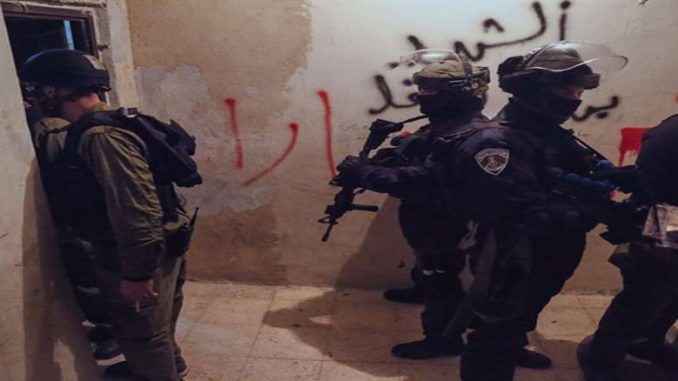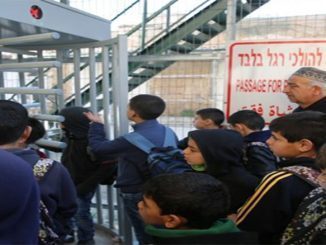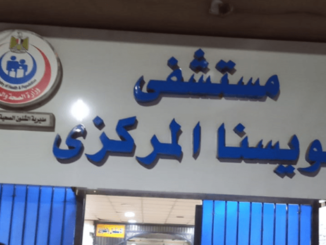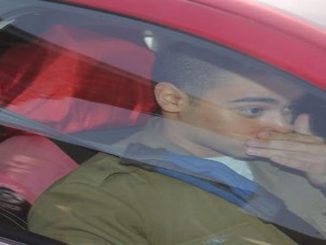
In the wake of a large-scale raid Sunday night in occupied East Jerusalem that targeted the families of Palestinians who were either slain or incarcerated after carrying out or allegedly carrying out attacks, one of the families reported to a local monitoring group that masked Israeli police violently assaulted them while breaking into their homes during the predawn raid.
At least 14 Palestinians were detained and tens of thousands of dollars’ worth of cash and property were confiscated in a number of East Jerusalem neighborhoods during Monday’s predawn hours, with police alleging the families were receiving support and financing from the Hamas movement, based on intelligence gathered by the Israeli general security service and police.
The massive raid came amid a surge in what rights groups have denounced as widespread collective punishment measures against Palestinians in occupied East Jerusalem, while Israeli daily Haaretz recently reported that intelligence gathering raids in East Jerusalem over the past two months were made in breach of protocol and constituted a violation of residents’ basic rights.
Local monitoring group in East Jerusalem, the Wadi Hilweh Information Center, reported on Monday that four members of al-Shaer family in the al-Tur neighborhood were assaulted and sustained bruises at the hands of Israeli police officers, who broke into the home at 3:30 am.
The group quoted Muhammad Adnan al-Shaer as saying Israeli forces broke into his father Adnan al-Shaer’s and his brother Subhi al-Shaer’s homes, assaulted family members, and used electric stun guns against them.
After the assault, Israeli officers detained 55-year-old Adnan al-Shaer, his wife Rabiha, 51, as well as their sons Mustafa, 21, and Subhi, 28. They were taken to the Russian Compound interrogation center for questioning.
Muhammad al-Shaer added that Israeli forces confiscated money and a truck belonging to his father, after officers inspected every single room of the houses, claiming they were looking for weapons.
Some of the attacking officers were masked. “The soldiers pushed my 13-year-old daughter Nagham for no reason, and when we protested against that, they violently and indiscriminately attacked us, beating everybody with batons,” the center quoted him as saying.
Subhi al-Shaer told the Wadi Hilweh Information Center that he tried to prevent police from searching his house because they did not have a warrant.
In response, the Israeli troops detained Subhi and took him to his father’s house where they also assaulted his sister. After they assaulted her, he said, an altercation broke out and police assaulted everybody before they handcuffed family members and held them in a single room.
Then, the soldiers dragged Subhi and his brother Mustafa to the staircase, where they attacked their legs with electric stun guns. The soldiers continued to beat Subhi in the street and inside the vehicle while he was transported to the Russian Compound.
The Israeli police then released the al-Shaer parents unconditionally. The two brothers were also released, but were placed on house arrest until Friday, in addition to a 500-shekel bail ($134) and a third-party bail.
After their release from detention, the four family members went to a medical center for treatment.
Adnan required stitches on the inside of his cheek and also suffered from bruises on his jaw. His wife Rabiha sustained bruises on her arm and on her shoulder.
Subhi had a stress fracture in his nasal bone, and Mustafa had bruises on the back and his limbs.
The same night, Israeli police broke into six other homes and made detentions, according to the Israeli police statement.
The al-Shaer family’s testimony corroborated a report by Haaretz last week that said over the past two months, some 500 Palestinian homes had been raided in East Jerusalem by Israeli police officers who did not present warrants, contrary to proper procedures.
All the raids were carried out between 1 and 4 a.m., according to a resident of a local committee cited by Haaretz.
“Residents living in the area said the policemen, often wearing masks, come to a different building every night. They then go from door to door, waking up the families in each apartment, asking for papers and taking details,” the report said.
Residents told Haaretz that the policemen did not present warrants, were not looking for anyone specific, and did search the apartments. “They hold an aerial photograph of the neighborhood, with which they register the residents’ names, including those of children and infants.”
According to Haaretz, the NGO Association for Civil Rights in Israel (ACRI) demanded that Israel’s Attorney General Avichai Mandelblit put an end to the raids immediately, and in response, a Justice Ministry lawyer admitted that there were flaws in the police work.
“After examining the matter, we found that the flaws have been fixed and the procedures sharpened to prevent their recurrence,” she wrote.
The letter was sent some two weeks ago, before Sunday night’s raid when the al-Shaer family reported the same procedures being carried out against them.
A lawyer from ACRI also wrote to the police’s legal adviser last Wednesday regarding the raids, according to Haaretz, when they said “This is a horrifying practice that has no place in a democracy,” adding that police were “riding roughshod over the residents’ basic rights to privacy, liberty and dignity, and must be stopped immediately.”
Israeli police reacted by defending the operation, saying that they carry out “targeted activity to foil terror and fight serious crimes. Every day, dozens of such acts are carried out in Jerusalem to ensure the residents’ safety.”
Meanwhile, rights groups Al‐Haq, Community Action Center (Al‐Quds University), BADIL, and Addameer issued a joint statement last week condemning “illegal collective punishment measures” by Israeli forces against Palestinian women and children in occupied East Jerusalem.
The joint statement said that the human rights organizations were “deeply concerned with the escalation of collective punishment measures against Palestinians from occupied East Jerusalem by Israel,” particularly in Jabal al-Mukabbir in the wake of a deadly vehicular attack in January.
Israeli Interior Minister Arye Deri reacted to the attack by deciding to revoke the Jerusalem residency status of 13 of driver’s relatives, including his mother. “From now on anyone who plots, plans, or considers carrying out an attack will know that his family will pay a heavy price for his deed,” Deri said.
“Revocation of residency rights, forcible transfer of protected persons, and punitive home demolitions all constitute serious violations of international human rights and humanitarian law and feed into Israel’s broader policies and practices of oppressing the protected population of occupied East Jerusalem,” the rights groups wrote.
The joint statement denounced Israel’s policy of collective punishment as “an effort to achieve a Jewish majority in the city and further consolidate Israel’s control over occupied East Jerusalem,” and demanded that Israel be held accountable for its violations of international law.



